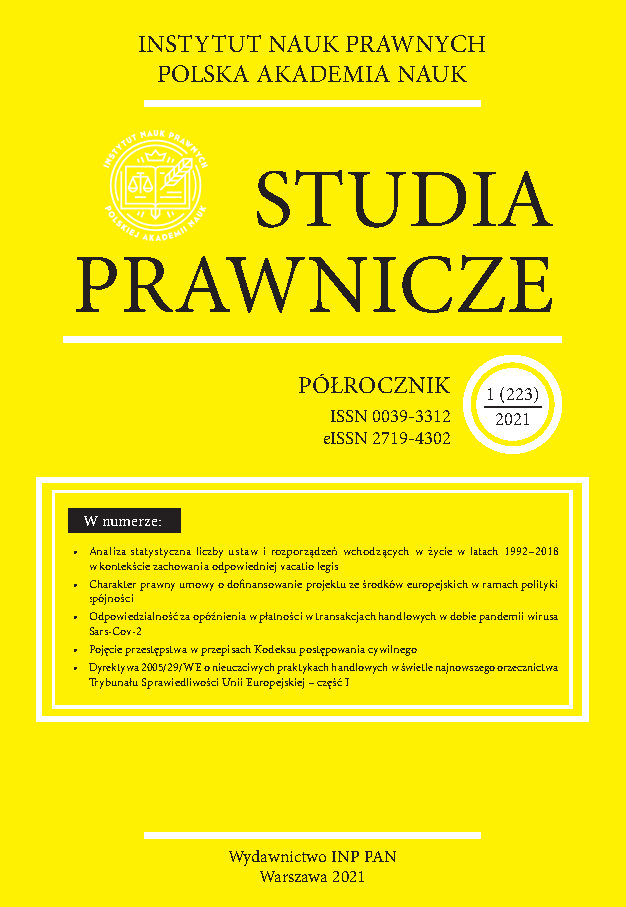O argumentacji komparatystycznej w ramach badań nad cywilnoprawnymi konsekwencjami urodzenia dziecka na skutek niewykonania niezakazazanej aborcji
About the comparative argumentation in the research on a birth of a child in effect of an unperformed non-banned abortion. As a source of a liability for compensation
Author(s): Krzysztof MularskiSubject(s): Law, Constitution, Jurisprudence
Published by: Instytut Nauk Prawnych PAN
Keywords: child; abortion; civil law; child born; compensation; comparative law
Summary/Abstract: There is a current discussion in Polish civil law whether an unperformed non-banned abortion can result in the formation of a liability for compensation, which includes in particular the costs of maintenance and upbringing of a born child. The aim of this article is not a research on the mentioned problem, but an attempt of analysis of one of the arguments used in the discussion. Aformation of the liability for compensation has been accepted in foreign law orders, which can be presented as a proof of the existence of the same liability in Polish civil law. However, this argument, referred to as ‘the normative comparatistics’, has been deemed as erroneous. First, norms of Polish law regarding abortion, according to which abortion is generally banned, are discordant and sometimes even contradictory to norms of law present in foreign legal systems in which abortion in principle is admissible. Second, discordant norms of law are justified in the light of discordant axiological values attributed to Polish legislator and foreign legislators; legislators were attributed preferential, instead of merit-related, opinions as, inter alia, definitely easier to determine and less disputable. Preferential axiological value attributed to Polish legislator was expressed in a way of following sentence: “life of a human [representative of the Homo sapiens species] before a birth is more important than financial position or mental state of other born human”, whereas in foreign legal systems there is assumed preferential axiological value resulting in following sentence: “life of a human before a birth is not more important than financial position or mental state of other born human” . Diversity of preferential axiological values originates from discordance or possible contradiction in ontic presuppositions regarding nasciturus assumed in Polish and foreign systems; on the ground of foreign systems there is assumed, simplifying, that nasciturus is not a human being. Finally, there are different social purposes, which these discordant and sometimes contradictory norms of law are designed to serve. The research allowed formulating conclusions that pose an attempt to interpret obtained outcomes on the ground of - inter alia - the assumptions concerning the methods of interpretation and its subject, the theory of law, the semiotics and the theory of argumentation. With regard to the assumptions concerning the methods of interpretation and its subject there have been indicated three types of the normative comparatistics’; the level of infringement of the rules of the interpretation accepted in Polish law culture has been deemed as the criterion of typology The first and the most common type infringes the assumptions of rules of the functional interpretation. The second - infringes the order of the linguistic guidelines of interpretation and the third one rejects the hierarchy of Polish sources of the law and accepts as a source of a law-for example-verdicts of the foreign courts. The last type has been recognized as an attempt to introduce of the foreign laws into the Polish legal system by the subjects, which do not exercise legislative power. With respect to the theory of law, on the basis of the H. L. A Hart’s concept, it has been regarded that subjects attempting to adopt foreign laws to Polish legal system assume so called “external point of view” in reference to norms of lawwhich are not in accordance with adopted norms of law. With regard to the semiotics, at least some of analyzed opinions do not have the nature of deontic propositions, but the nature of assessment (values) of Polish legal system. Eventually, with respect to the theory of argumentation, the normative comparatistics’ takes the form of the “generally accepted view-fallacy”, which is considered as a particular type of so called “appeal to authority-fallacy” (argumentum ad verecundiam). A research on the rightness of thesis, which is accepted by some scholars that unperforming of non-banned abortion may result in the formation of a liability for compensation, which includes also the costs of maintenance and upbringing of a born child, was not the purpose of this work. Therefore, possible refutation of the comparative argument will not entail refutation of the thesis, which is supported by other arguments as well.
Journal: Studia Prawnicze
- Issue Year: 2009
- Issue No: 1-2
- Page Range: 203-235
- Page Count: 33
- Language: Polish

